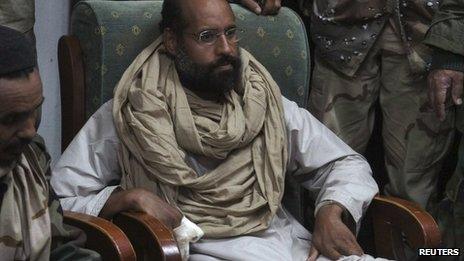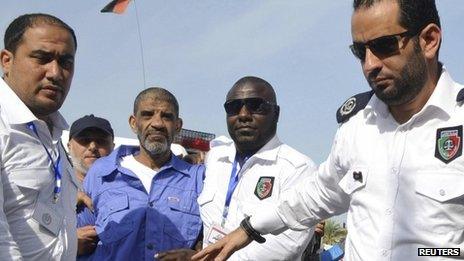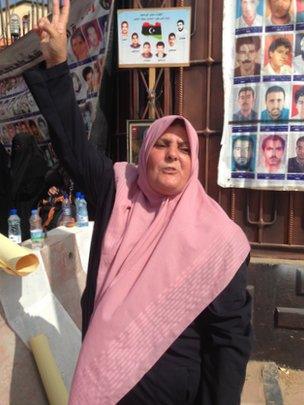Saif al-Islam Gaddafi transfer for Tripoli hearing blocked
- Published

Saif al-Islam Gaddafi was seen as the most likely successor to his father
The militia holding the son of late Libyan leader Muammar Gaddafi, Saif al-Islam, has refused to transfer him to the capital for a pre-trial hearing.
"The security situation does not permit his transfer," Zintan militia head Ajami al-Ateri told the BBC.
Libya's attorney general said he had ordered that Saif al-Islam be present at the Tripoli hearing.
He did appear in court in Zintan earlier on Thursday in a separate case, which was adjourned until 12 December.
He faces accusations of trading information threatening Libya's national security.
Saif al-Islam Gaddafi has also been indicted by the International Criminal Court (ICC) on war crimes charges relating to the 2011 uprising which toppled his father.
'Traitors'
The pre-trial hearing in Tripoli which involves 37 other defendants, including the late Libyan leader's spy chief Abdullah al-Senussi, went ahead without Mr Gaddafi.
The BBC's Rana Jawad in Tripoli says his no-show reveals the continuing deadlock and distrust between Zintan and national officials.

Abdullah al-Senussi, who was at the hearing, was arrested in Mauritania in 2012
The pre-trail hearing took place at Hadba Prison, in the south of the city, where most of the accused are being held.
It was a closed-door session and security in the area was tight with the entire road to the prison compound and shops in the area closed, our reporter says.
The hearing was adjourned until 3rd October.
The charges against all the defendants include activities aimed at instigating civil war, incitement to rape and performing acts of arbitrary killings during the uprising, she says.
The chamber has the authority to dismiss a case, order new investigations or re-issue charges.
"I don't know how long it will take, as you know, they have thousands of files and documents to review... There are more than 40,000," Libya's Attorney General Abdel-Quader Radwan told journalists on Wednesday.
Some protesters gathered outside the court, angered that the charges only cover alleged crimes committed during the civil war.

This protester outside the pre-trial hearing said she wanted to see Abdullah al-Senussi hang
When the defence and prosecution lawyers left the court compound they were pushed around by the mainly female protesters gathered outside, witnesses told our reporter.
Shouting "traitors", many of the protesters were relatives of those killed in a prison massacre in Tripoli in 1996, she says.
As head of military intelligence at the time, witnesses say Mr Senussi gave the order to shoot protesting prisoners at the notorious Abu Salim jail.
Nearly 1,300 prisoners, who had been demanding better conditions and fairer trials, were killed.
Mr Senussi, who was Muammar Gaddafi's brother-in-law, is also wanted by the ICC, accused of responsibility for crimes against humanity during the uprising.
Saif al-Islam Gaddafi, who was seen as the most likely successor to his father, was captured by militias in the desert town of Ubari in November 2011 - allegedly trying to flee the country - and has been held in the western town of Zintan ever since.
The charges he faces in Zintan are linked to a visit he received in June 2012 from ICC lawyer Melinda Taylor and three other ICC staff, who allegedly clandestinely passed him a coded letter from a fugitive former aide.